|
|
|
Sort Order |
|
|
|
Items / Page
|
|
|
|
|
|
|
| Srl | Item |
| 1 |
ID:
142646
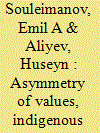

|
|
|
|
|
| Summary/Abstract |
This article fills the gap in existing scholarship on asymmetric conflict, indigenous forces, and how socio-cultural codes shape the dynamics and outcomes of conflict transformation. Specifically, it identifies three key socio-cultural values commonplace in honorific societies: retaliation, hospitality, and silence. As sources of effective pro-insurgent violent mobilisation and support from among the local population, these values provide insurgents with an asymmetric advantage over much stronger incumbents. Using the case studies of the two Russian counterinsurgencies in Chechnya, the article shows the mechanisms on the ground through which Moscow’s deployment of indigenous forces against insurgents helped to stem the tide of conflict, reversing the insurgents’ initial advantage in terms of asymmetry of values.
|
|
|
|
|
|
|
|
|
|
|
|
|
|
|
|
| 2 |
ID:
142648
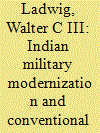

|
|
|
|
|
| Summary/Abstract |
In recent years, headline grabbing increases in the Indian defense budget have raised concerns that India’s on-going military modernization threatens to upset the delicate conventional military balance vis-à-vis Pakistan. Such an eventuality is taken as justification for Islamabad’s pursuit of tactical-nuclear weapons and other actions that have worrisome implications for strategic stability on the subcontinent. This article examines the prospects for Pakistan’s conventional deterrence in the near to medium term, and concludes that it is much better than the pessimists allege. A host of factors, including terrain, the favorable deployment of Pakistani forces, and a lack of strategic surprise in the most likely conflict scenarios, will mitigate whatever advantages India may be gaining through military modernization. Despite a growing technological edge in some areas, Indian policymakers cannot be confident that even a limited resort to military force would achieve a rapid result, which is an essential pre-condition for deterrence failure.
|
|
|
|
|
|
|
|
|
|
|
|
|
|
|
|
| 3 |
ID:
142645


|
|
|
|
|
| Summary/Abstract |
This article analyses the steps taken by the Russian government, with the aid of a powerful local clan, the so-called Kadyrovtsy, to subdue the Chechen insurgency. It highlights the strategy used by Russia, under whose patronage former anti-Russian guerrilla fighters were transformed into paramilitary allies of the Russian government; later these former insurgents were incorporated into the regular Russian army and other state security forces. The article also identifies problems that are connected with the activities of the Kadyrovtsy in Chechnya and Russia, and the spillover into the diaspora; it also contextualises the issues faced by the contemporary Chechen ruling clan and the geopolitics of the Caucasus within the research framework of paramilitarism and counterinsurgency.
|
|
|
|
|
|
|
|
|
|
|
|
|
|
|
|
| 4 |
ID:
142642
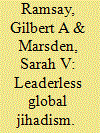

|
|
|
|
|
| Summary/Abstract |
Jihadist violence is typically associated with being particularly indiscriminate. Often, as in variations of the ‘new terrorism’ thesis, this characteristic is proposed to correspond in some way to its other attributes such as its globalised, decentralised and ‘postmodern’ religious nature. Recent work appears to give more substance to such claims, by claiming to show a relationship between indiscriminate violence and decentralised group organisation. However, in this paper we show, based on an analysis of jihadist targeting in Western Europe and America from 2001 to 2013, that targeting choices by jihadists unconnected to organised militant groups have in fact been consistently more, rather than less discriminate in their targeting choices than their better-integrated peers. Drawing on this finding, as well as a broader reading of jihadist targeting discourses, we argue for a more complex understanding of the relationship between radicalisation, extremist ideology, decentralisation, and targeting choice.
|
|
|
|
|
|
|
|
|
|
|
|
|
|
|
|
| 5 |
ID:
142643
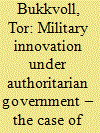

|
|
|
|
|
| Summary/Abstract |
Russian Special Forces saw significant changes to both organization and doctrine in the years after 2008. The special forces of the General Staff’s Main Intelligence Directorate were reduced in number, the organization’s institutional autonomy and rationale were changed, and an entirely new Special Operations Command was established in March 2013. This article seeks to assess the nature, scope and purpose of these changes, and to explain them by drawing on scholarship on military innovation. In particular, the article looks at military innovation in the context of a non-democratic political regime.
|
|
|
|
|
|
|
|
|
|
|
|
|
|
|
|
| 6 |
ID:
142644
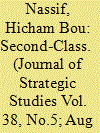

|
|
|
|
|
| Summary/Abstract |
The defection of a significant number of Sunni officers amidst the ongoing turmoil in Syria created a unique opportunity to get access to original data on the Syrian armed forces. This study draws on extensive fieldwork to probe the sectarian question in the Syrian officer corps. On the basis of a series of interviews conducted throughout the summer of 2014, I investigate the politics and consequences of sectarian stacking in the Syrian military as well as the root causes of Sunni officers’ grievances and alienation. My conclusions draw on an original database that compiles the sectarian affiliations of 81 prominent officers who occupied the most senior military positions under Bashar al-Asad.
|
|
|
|
|
|
|
|
|
|
|
|
|
|
|
|
| 7 |
ID:
142647
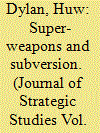

|
|
|
|
|
| Summary/Abstract |
This article examines British deception operations in the early Cold War. It illustrates how, in the years before Britain could threaten atomic retaliation, Britain’s deception organisation, the London Controlling Section (LCS) was tasked with conducting operations to deter the USSR and China from starting a war or threatening British interests. It introduces a number of their ploys – some physical and military, others subversive and political. It argues that the LCS faced significant challenges in implementing its deceptions. Repeating the great strategic successes of the Second World War was extremely difficult; what remained for the Cold War were more limited deceptions.
|
|
|
|
|
|
|
|
|
|
|
|
|
|
|
|
|
|
|
|
|